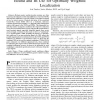Free Online Productivity Tools
i2Speak
i2Symbol
i2OCR
iTex2Img
iWeb2Print
iWeb2Shot
i2Type
iPdf2Split
iPdf2Merge
i2Bopomofo
i2Arabic
i2Style
i2Image
i2PDF
iLatex2Rtf
Sci2ools
123
click to vote
TSP
2011
2011
Joint TDOA and FDOA Estimation: A Conditional Bound and Its Use for Optimally Weighted Localization
—Modern passive emitter-location systems are often based on joint estimation of the time-difference of arrival (TDOA) and frequency-difference of arrival (FDOA) of an unknown signal at two (or more) sensors. Classical derivation of the associated Cramér-Rao bound (CRB) relies on a stochastic, stationary Gaussian signal-model, leading to a diagonal Fisher information matrix with respect to the TDOA and FDOA. This diagonality implies that (under asymptotic conditions) the respective estimation errors are uncorrelated. However, for some specific (nonstationary, non-Gaussian) signals, especially chirp-like signals, these errors can be strongly correlated. In this work we derive a “conditional” (or a “signal-specific”) CRB, modeling the signal as a deterministic unknown. Given any particular signal, our CRB reflects the possible signal-induced correlation between the TDOA and FDOA estimates. In addition to its theoretical value, we show that the resulting CRB can be used for o...
Respective Estimation Errors | Stationary Gaussian Signal-model | TSP 2011 | —Modern Passive Emitter-location |
| Added | 15 May 2011 |
| Updated | 15 May 2011 |
| Type | Journal |
| Year | 2011 |
| Where | TSP |
| Authors | Arie Yeredor, Eyal Angel |
Comments (0)

